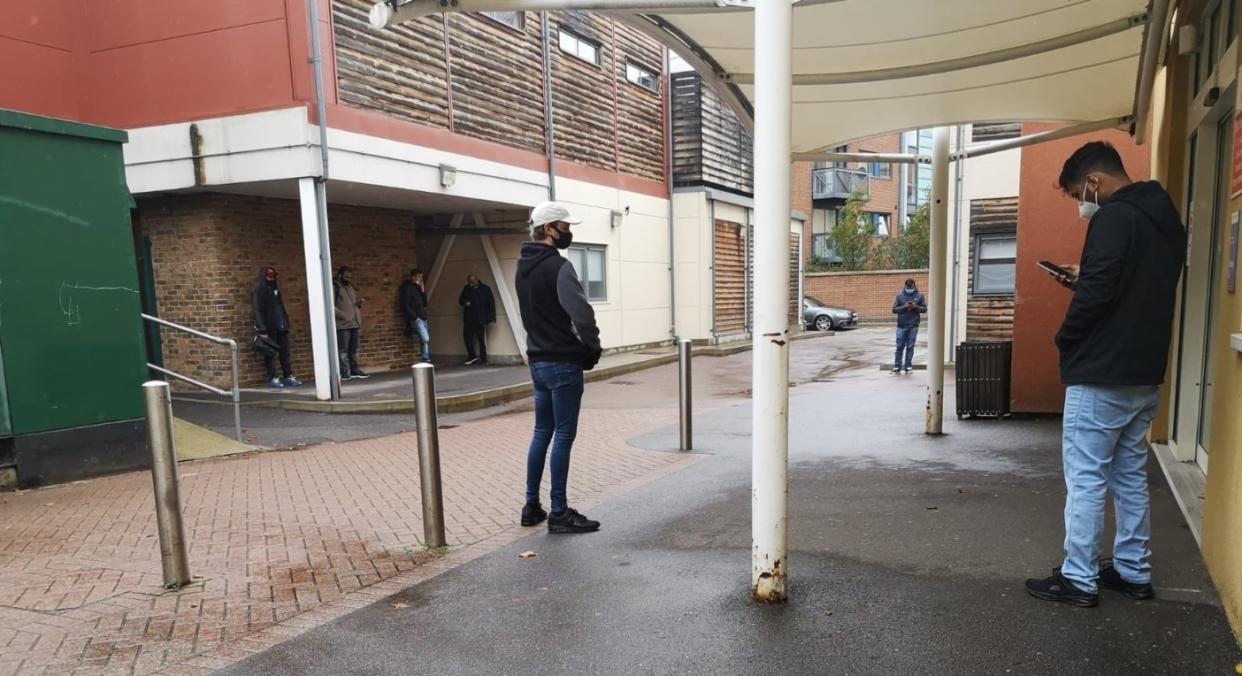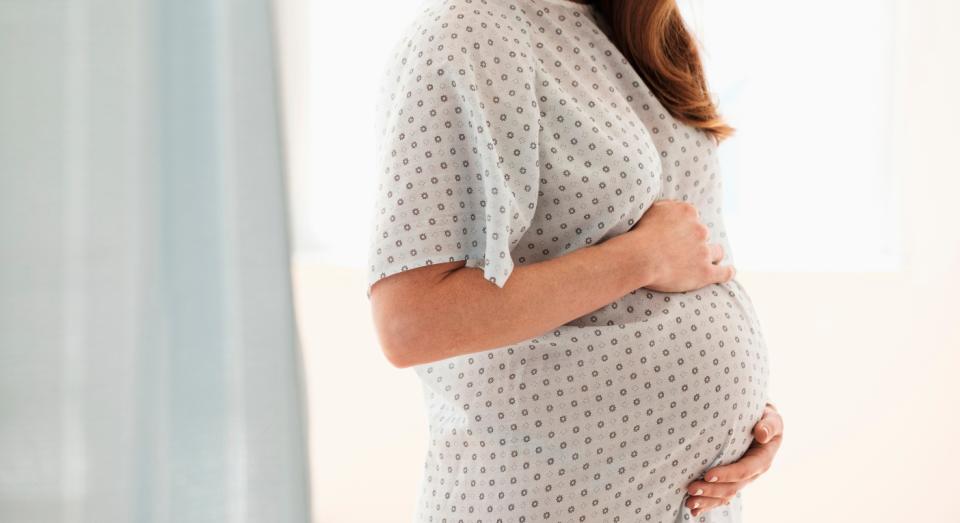'We were told she'd miscarried. Then I was told to go outside.' Poignant photo shows men waiting by maternity ward due to coronavirus restrictions

A man has shared a photo of seven masked men waiting outside a maternity ward, to raise awareness of the impact of restrictions in place due to the coronavirus pandemic.
The man had been asked to wait outside the hospital after being told his wife had suffered a miscarriage.
He shared the photo he took in October, with the charity Pregnant Then Screwed, who posted it on Twitter with a hashtag for a campaign that seeks to lift current restrictions on birth partners.
“This is a picture of seven masked dads waiting outside a maternity ward in the desperate hope they can go in to support their partner through their scan or early labour. It’s not fair. This needs to change #butnotmaternity,” the tweet read.
Read more: How to breastfeed safely during the pandemic, according to doctors
So far, the tweet has received more than 100 retweets and 320 likes. One Twitter user replied saying, “This is truly one of the saddest pictures.”
Another, an expectant mother, said: “This is what concerns me. I'm due in February, my first child, my partner's first child. Will I have to do this alone? It's a scary thought.”
This is a picture of 7 masked dads waiting outside a maternity ward in the desperate hope they can go in to support their partner through their scan or early labour. It’s not fair. This needs to change #butnotmaternity pic.twitter.com/XRO1oDdtsG
— PregnantThenScrewed (@PregnantScrewed) October 27, 2020
The effects of the pandemic have been felt across all of society and expectant parents in particular have had to adapt to a series of new restrictions as a result of Covid-19.
When coronavirus first started to spread in the UK, hospital visitor numbers were kept to a minimum to help protect the NHS, which meant many pregnant women had to attend scans on their own.
For the birth itself, the NHS says a birth partner can be present during labour and birth (as long as they don’t have coronavirus), but there are limits on how long they can stay after the baby is born.
While official guidance from the NHS and Boris Johnson has called for an easing of these restrictions, the Guardian reports that 43% of NHS Trusts are still placing tough restrictions on partners being present for hospital visits and during births - and this number may well rise again, due to a need to protect staff and patients as coronavirus transmissions increase once more.
Read more: How Chrissy Teigen is talking to Luna and Miles about their brother Jack
The man who shared the photo with Pregnant Then Screwed, has spoken to Yahoo UK about his experience. He has asked to remain anonymous.
He says: “I was eventually called in. We went in to our 12 week scan and found out that my wife had an early miscarriage with the pregnancy sac, but no sign of a foetus. The doctor was excellent and very compassionate as she told us what we needed to do.
“We were then sent to another unit for 'early pregnancy' and 15 minutes after we are told that news, I'm told I have to wait outside the waiting area.
“As a man, you feel entirely helpless when you receive the earlier news, there is nothing you can do to control the situation and then you are shunted outside by the lifts staring through a gap in a window at your wife, just wanting to help in some way. This cannot be right.
“My wife went through and was told about what she could and should do next, and [she] told me after it was a lot to take in and me being there would have helped her decision making with regards to her options and put her more at ease.”
Joeli Brearley, CEO and founder of Pregnant Then Screwed says that we need to stop using the term “visitors” when talking about partners being with women during maternal care and labour.
Watch: Chrissy Teigen breaks silence a month after losing Jack at 20 weeks
Read more: Binky Felstead praised by charities for helping to break the taboo surrounding miscarriage
She says: “[Birth partners] are advocates in what can be a life or death situation, for the child and the mother. By denying both parents the right to be involved in maternal care, important decisions and the entirety of labour, we are creating a mental health epidemic of the future.
“Research clearly shows that stress and anxiety in pregnant women can trigger postnatal depression. We also know that partners being present reduces those stress levels.
“The torment does not stop when they take their baby home. We are hearing from so many mothers who are being diagnosed with PTSD because of their experiences.
“Pregnant women and their babies are some of the most precious and vulnerable people in our society, it is essential that we prioritise them and give them the support that they need by not leaving them to go through this alone.”

As some British hospitals continue to decline attendance for partners at antenatal scans and during labour, pregnant women have been posting pictures of their bumps on social media to support the #ButNotMaternity campaign, which seeks to lift restrictions on birth partners being present.
The campaign’s petition currently has over half a million signatures.
A spokesperson for the NHS told Yahoo UK that one of the reasons partners are being kept outside is due to the small size of scan rooms, which makes social distancing harder.
Read more: What is squamous cell bladder cancer and what are the symptoms?
The spokesperson continues: “For birth partners, since March and all through the pandemic they’ve been allowed to join the birth.
“Scans are a little bit different, because some Trusts are not [allowing partners in] but we did issue some guidance in September that encourages Trusts to allow that to happen, but there seems to be some variation on how that is being implemented. I think that’s normal, even if we weren’t in a pandemic there would be different rules for different organisations.
“[Hospitals] are trying to let partners in as much as possible, but there will be different rules.”
The spokesperson explained that the reason rules differ between hospitals is likely to be based on where the hospital is located.
“The North East and North West are struggling at the minute as they have so many cases up there. Whereas they have less in the South West,” they added.
Jo Mountfield, consultant obstetrician and vice president of the Royal College of Obstetricians and Gynaecologists (RCOG) says they are “acutely aware” of how difficult these restrictions can be for women and their birth partners.
“Guidance developed by the RCOG, RCM and the Society and College of Radiographers, in partnership with NHS England and NHS Improvement, and released in September aims to support maternity services with the local reintroduction of hospital visitors, where it was safe to do so,” Mountfield adds.
“However, with the number of coronavirus cases growing across the UK we realise that some Trusts are reluctantly having to keep some of the restrictions in place. There are other situations when restrictions may have to be in place for partners, such as when the rooms in which scans are done are too small to allow safe social distancing.
"We encourage Trusts who have to reinstate their visitor restrictions in maternity services to regularly review their decision making, using the framework we have provided."
Watch: Mum who had premature twins during lockdown says daughter predicted her pregnancy



